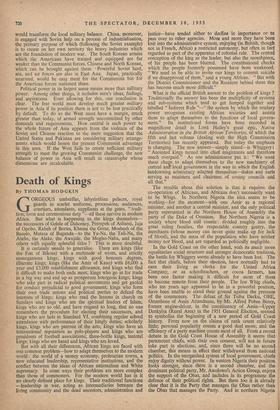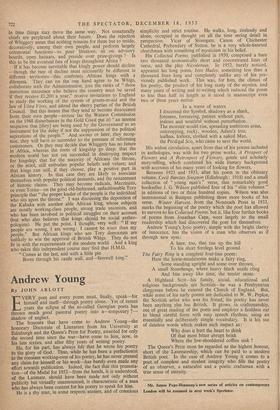Death of Kings
By THOMAS HODGKIN
GORGEOUS umbrellas, labyrinthine palaces, royal guards in scarlet uniforms, processions, audiences, courtiers, attendants, suppliants at the gates, "'tradi- tion, form and ceremonious duty "—all these survive in modern Africa. But what is happening to the kings themselves— the successors of Gelele of Dahomey, Prempeh of Ashanti, Jaja of Opobo, Rabeh of Bornu, Khama the Great, Moshesh of the Basuto, Mutesa of Buganda—to the Ya-Na, the Tali-Na, the Alafin, the Alake, the Awujale, the Mogho-Naba, and many others with equally splendid titles ? This is more doubtful. It is certainly unsafe to generalise. There are kings (like the Fon of Bikom) with a multitude of wives, and strictly monogamous kings; kings with good honours degrees, illiterate kings; kings (like the Amir of Kano) with £6,000 a year and £3,000 establishment allowance, and kings who find it difficult to make both ends meet; kings who go in for trade in a big way and end up as prosperous bourgeois kings; kings who take part in radical political movements and get gaoled for conduct prejudicial to good government; kings who form their own trade unions and political parties to defend the interests of kings; kings who read the lessons in church on Sundays and kings who are the spiritual leaders of Islam; kings who are so old, and have reigned so long, that no one remembers the procedure for electing their successors, and kings who are lads in Standard VI, combining regular school attendance with performance of their kingly duties; scholarly kings, kings who are patrons of the arts; kings who have an international reputation as polo-players and kings who are presidents of football associations; three-bottle kings, teetotal kings; kings who are hated and kings who are loved. But with all their differences, African kings are faced with one common problem—how to adapt themselves to the modem world : the world of a money economy, proletarian towns, a new educated leadership, representative institutions, and the conflict between the ideas of African nationalism and White supremacy. In some ways their problems are more complex than those of commoners. For the modern world has in it no clearly defined place for kings. Their traditional-functions —leadership in war, acting as intermediaries between the living community and the dead ancestors, administration and justice—have tended either to decline in importance or to pass over to other agencies. More and more they have been knit into the administrative system, enjoying (in British, though not in French, Africa) a restricted autonomy, but often in fact regarded as part of the apparatus of colonial rule. The central conception of the king as the leader, but also the mouthpiece, of his people has been blurred. The constitutional checks which the people formerly possessed have been weakened. " We used to be able to invite our kings to commit suicide if we disapproved of them," said a young African. " But with the District Commissioner and the Resident behind them this has become much more difficult."
What is the official British answer to the problem of kings ? Traditionally the answer has been the multiplicity of systems and sub-systems which tend to get lumped together and labelled " Indirect Rule "—" the system by which the tutelary power recognises existing African societies and assists them to adapt themselves to the functions of local govern. ment." Its institutional forms have been recorded in magnificent detail in Lord Hailey's great epic, Native Administration in the British African Territories, of which the fifth and last volume (dealing with the High Commission Territories) has recently appeared. But today the emphasis is changing. The new answer—simply stated—is Whiggery " Anointed kings turned into chief magistrates and therefore much overpaid." As one administrator put it: " We want these chaps to adapt themselves to the new machinery of central and local government in the way in which the English landowning aristocracy adapted themselves--dukes and earls serving as ministers and chairmen of county councils and all that."
The trouble about this solution is that it requires the co-operation of Africans, and Africans don't necessarily want to be Whigs. In Northern Nigeria the idea seems to be working—for the moment—with one Amir as a regional minister, and another a central minister, and the only political party represented in the Northern House of Assembly the party of the Duke of Omnium. But Northern Nigeria is a society where blood still counts : divided roughly into the great ruling families, the respectable country gentry, the merchants (whose money can never quite make up for lack of blood), and the mass of the population who have neither money nor blood, and are regarded as politically negligible.
In the Gold Coast on the other hand, with its much more equalitarian social structure and stronger democratic tradition, the battle for Whiggery seems already to have been lost. The fact that chiefs, before their election, have normally had to earn their living as clerks for the United Africa Company, or as schoolteachers, or cocoa farmers, has been one factor making it difficult for most of them to become remote from their people. The few Whig chiefs, who ten years ago appeared to be in a powerful position, have been unable to stand their ground against the pressure of the commoners. The defeat of Sir Tsibu Darku, OBE, Omanhene of Assin Attandansu, by Mr. Alfred Pobee Biney, former engine-driver, in the constituency of Assin—Upper Denkyira (Rural Area) in the 1951 General Election, seemed to symbolise the beginning of a new period of Gold Coast history. From now on the claims of rank count relatively little; personal popularity counts a' good deal more; and the efficiency of a party machine counts most of all. From a recent debate in the Gold Coast House of Assembly it seems that paramount chiefs, with their own consent, will not in future take part in elections; and, since there will be no second chamber, this means in effect their withdrawal from national politics. In the reorganised system of local government, chiefs enjoy dignity without power. In western Nigeria their position looks stronger, since there is a second chamber, and the dominant political party, Mr. Awolowo's Action Group, enjoys the support of the Obas, and includes in its programme the defence of their political rights. But there too it is already clear that it is the Party that manages the Obas rather than the Obas that manages the Party. And in northern Nigeria in time things may move the same way. Not unnaturally chiefs are perplexed about their future. Does the rejection of Whiggery mean that nothing remains for them but to reside, decoratively, among their own people, and perform largely ceremonial functions—to pour libations, sit on advisory boards, open bazaars, and preside over prize-givings ? Is this to be the eventual fate of kings throughout Africa ?
If it has become inevitable that kingly power should decline —though the rate of decline must necessarily be different in different territories—this confronts African kings with a dilemma. They can on the one hand agree to be Whigs, collaborate with the Administration, join the ranks of ". those numerous statesmen who believe the country must be saved if they receive £1,200 a year," receive invitations to England to study the working of the system of grants-in-aid and the law of Ultra Vires, and attend the sherry parties of the British Council. But this means that they tend to become dissociated from their own people—arouse (as the Watson Commission on the 1948 disturbances in the Gold Coast put it) " an intense suspicion that [they] are being used by the Government as an instrument for the delay if not the suppression of the political aspirations of the people." And sooner or later, they recog- nise, they will have to surrender to the pressure of reforming commoners. Or they may decide that Whiggery has no future in -Africa, whereas the roots of kingship go deep; that the modern world has not yet succeeded in destroying respect for kingship; that for the majority of Africans the throne, or the stool, still embodies popular beliefs and values; and that kings can still, if they choose, play a positive part in African history. In that case they are likely to associate themselves with popular political demands, and the restatement of historic claims. They may become radicals, MazzinistS, or even Tories—on the good old-fashioned, unfashionable Tory principle that " the proper leader of the people is the individual who sits upon the throne." I was discussing the deposition of the Kabaka with another able African king, whose subjects are mostly working-class people, strong trade unionists, and who has been involved in political struggles on their account (but who also believes that kings should be social anthro- pologists). He put the point, I thought, very well : " If my people are wrong, I am wrong: I cannot be wiser than my people." But African kings who are Tory democrats are unlikely to win the approval of British Whigs. They do not fit in with the requirements of the modern world. And a king who takes this independent course may find that H.M.G.
" Comes at the last, and with a little pin Bores through his castle wall, and—farewell king."











































 Previous page
Previous page